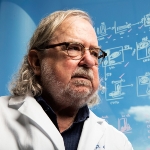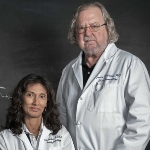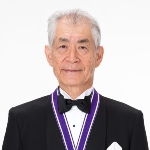Background
Allison was born on August 7, 1948, in Alice, Texas. He is the youngest of three sons of Constance Kalula (Lynn) and Albert Murphy Allison. His mother died of lymphoma when he was 11. His brother died of prostate cancer in 2005.


2015
2 East 61st Street &, 5th Avenue, New York, NY 10065, United States
Padmanee Sharma, MD, PhD and James P. Allison attend the Prostate Cancer Foundation Invites You To The 2015 New York Dinner With Celebrity Hosts Whoopi Goldberg & John O'Hurley At The Pierre Hotel at The Pierre Hotel on December 2, 2015 in New York City.

2015
60323 Frankfurt, Germany
The US immunotherapist James P. Allison speaks after a press conference on the Paul Ehrlich and Ludwig Darmstaedter Prize at the Johann Wolfgang Goethe University. The Nobel Prize for Medicine this year goes to James Allison and Tasuku Honjo for the development of special cancer therapies. This was announced by the Karolinska Institute in Stockholm. Photo: Christoph Schmidt/dpa (Photo by Christoph Schmidt/picture alliance via Getty Images)

2015
60323 Frankfurt, Germany
The US immunotherapist James P. Allison speaks after a press conference on the Paul Ehrlich and Ludwig Darmstaedter Prize at the Johann Wolfgang Goethe University. The Nobel Prize for Medicine this year goes to James Allison and Tasuku Honjo for the development of special cancer therapies. This was announced by the Karolinska Institute in Stockholm. Photo: Christoph Schmidt/dpa (Photo by Christoph Schmidt/picture alliance via Getty Images)

2015
60323 Frankfurt, Germany
The US immunotherapist James P. Allison, taken after a press conference on the Paul Ehrlich and Ludwig Darmstaedter Prize at the Johann Wolfgang Goethe University. The Nobel Prize for Medicine this year goes to James Allison and Tasuku Honjo for the development of special cancer therapies. This was announced by the Karolinska Institute in Stockholm. Photo: Christoph Schmidt/dpa (Photo by Christoph Schmidt/picture alliance via Getty Images)

2015
60323 Frankfurt, Germany
The US immunotherapist James P. Allison, taken after a press conference on the Paul Ehrlich and Ludwig Darmstaedter Prize at the Johann Wolfgang Goethe University. The Nobel Prize for Medicine this year goes to James Allison and Tasuku Honjo for the development of special cancer therapies. This was announced by the Karolinska Institute in Stockholm. Photo: Christoph Schmidt/dpa (Photo by Christoph Schmidt/picture alliance via Getty Images)
1980
United States
James Allison at work in the laboratory in the late 1980s (Photo credit: James P Allison)
1980
United States
James Allison at work in the laboratory in the late 1980s (Photo credit: James P Allison)
2011
Jacob Heskel Gabbay Award for Biotechnology and Medicine
2014
Tang Prize in Biopharmaceutical Science
2014
James P. Allison plays the harmonica with his band, The CheckPoints. Image credits: Society for Immunotherapy of Cancer (SITC)
2015
Distinguished Alumnus Award
2015
2 East 61st Street &, 5th Avenue, New York, NY 10065, United States
Padmanee Sharma, MD, PhD and James P. Allison attend the Prostate Cancer Foundation Invites You To The 2015 New York Dinner With Celebrity Hosts Whoopi Goldberg & John O'Hurley At The Pierre Hotel at The Pierre Hotel on December 2, 2015 in New York City.
2015
60323 Frankfurt, Germany
The US immunotherapist James P. Allison speaks after a press conference on the Paul Ehrlich and Ludwig Darmstaedter Prize at the Johann Wolfgang Goethe University. The Nobel Prize for Medicine this year goes to James Allison and Tasuku Honjo for the development of special cancer therapies. This was announced by the Karolinska Institute in Stockholm. Photo: Christoph Schmidt/dpa (Photo by Christoph Schmidt/picture alliance via Getty Images)
2015
60323 Frankfurt, Germany
The US immunotherapist James P. Allison speaks after a press conference on the Paul Ehrlich and Ludwig Darmstaedter Prize at the Johann Wolfgang Goethe University. The Nobel Prize for Medicine this year goes to James Allison and Tasuku Honjo for the development of special cancer therapies. This was announced by the Karolinska Institute in Stockholm. Photo: Christoph Schmidt/dpa (Photo by Christoph Schmidt/picture alliance via Getty Images)
2015
60323 Frankfurt, Germany
The US immunotherapist James P. Allison, taken after a press conference on the Paul Ehrlich and Ludwig Darmstaedter Prize at the Johann Wolfgang Goethe University. The Nobel Prize for Medicine this year goes to James Allison and Tasuku Honjo for the development of special cancer therapies. This was announced by the Karolinska Institute in Stockholm. Photo: Christoph Schmidt/dpa (Photo by Christoph Schmidt/picture alliance via Getty Images)
2015
60323 Frankfurt, Germany
The US immunotherapist James P. Allison, taken after a press conference on the Paul Ehrlich and Ludwig Darmstaedter Prize at the Johann Wolfgang Goethe University. The Nobel Prize for Medicine this year goes to James Allison and Tasuku Honjo for the development of special cancer therapies. This was announced by the Karolinska Institute in Stockholm. Photo: Christoph Schmidt/dpa (Photo by Christoph Schmidt/picture alliance via Getty Images)
2015
60323 Frankfurt, Germany
US immunotherapists James P. Allison (L) and Carl H. June stand in front of representatives from the media after a press conference on the Paul Ehrlich and Ludwig Darmstaedter Prize at the Johann Wolfgang Goethe University in Frankfurt am Main, Germany, 14 March 2015. Allison and June are receiving the Paul Ehrlich and Ludwig Darmstaedter Prize, which includes prize money of 100,000 euros. Allison developed an immunotheraphy against melanoma, June against leukemia. Photo: CHRISTOPH SCHMIDT/dpa | usage worldwide (Photo by Christoph Schmidt/picture alliance via Getty Images)
2016
United States
Jim Allison, photographed in Houston on September 9, 2016. Photograph by LeAnn Mueller
2017
Balzan Prize for Immunological Approaches in Cancer Therapy
2017
James P. Allison in his laboratory in Houston. He discovered an alternative to using radiation to fight cancer, finding a way to set T-cells loose on the disease. CreditScott Dalton for The New York Times
2017
1515 Holcombe Blvd, Houston, TX 77030, USA
Jim Allison in his lab at the University of Texas MD Anderson Cancer Center in Houston. Scott Dalton for NPR
2018
Nobel Prize in Physiology or Medicine, Stockholm
2018
King Faisal Prize in Medicine
2018
Jessie Stevenson Kovalenko Medal
2018
Albany Medical Center Prize
2018
43 New Scotland Ave, Albany, NY 12208, USA
James P. Allison speaks at the Albany Medical Center.
James P. Allison
James P. Allison
James P. Allison
James was inspired by his 8th grade math teacher to pursue a career in science, spending a summer in a NSF–funded summer science-training program at the University of Texas, Austin and completing high school biology by correspondence course at Alice High School.
He earned a B.S. degree in microbiology from University of Texas, Austin in 1969, where he was a member of Delta Kappa Epsilon fraternity.
He earned his Ph.D. degree in biological science in 1973, also from UT Austin, as a student of G. Barrie Kitto.
9th Annual Szent-Györgyi Prize
Canada Gairdner International Award
Louisa Gross Horwitz Prize
Lasker-DeBakey Clinical Medical Research Award
Wolf Prize in Medicin






































(For some time immunotherapy has been heralded as a breakt...)
For some time immunotherapy has been heralded as a breakthrough approach for cancer treatment. Although the potential of this strategy remains solid, the approach needs considerable refinement. Whilst some programmes are looking to increase the understanding of molecular and cellular mechanisms underlying the stimulation of antitumor immunity, others are trying to find the most appropriate clinical setting that will reveal the role of the immune system in combating cancer. Among the most important discoveries have been tumor-specific antigens. This thematic volume highlights some key issues and discusses where they may move forward. It has been put together by two leading cancer immunotherapists from two eminent institutions that focus on cancer research.
http://www.amazon.com/gp/product/0124111378/?tag=2022091-20
Allison was born on August 7, 1948, in Alice, Texas. He is the youngest of three sons of Constance Kalula (Lynn) and Albert Murphy Allison. His mother died of lymphoma when he was 11. His brother died of prostate cancer in 2005.
James was inspired by his 8th grade math teacher to pursue a career in science, spending a summer in a NSF–funded summer science-training program at the University of Texas, Austin and completing high school biology by correspondence course at Alice High School.
At age 15, Allison participated in a science-training program at the University of Texas at Austin (UT Austin), which fueled his already developing interest in science. He earned a B.S. degree in microbiology from University of Texas, Austin in 1969, where he was a member of Delta Kappa Epsilon fraternity. He earned his Ph.D. degree in biological science in 1973, also from UT Austin, as a student of G. Barrie Kitto.
At cripps Clinic and Research Foundation, Allison worked primarily on amino acid sequencing but also found time to carry out experiments on immune cell function. These experiments led to his first major discovery concerning tumour recognition by the immune system.
In the mid-1970s, Allison moved to the University of Texas MD Anderson Cancer Center, joining the faculty there as an assistant biochemist. His research centred on elucidating the mechanism by which T cells recognize foreign particles, or antigens. During this time, he also successfully mapped the structure of the T-cell antigen receptor. In 1985, after transitioning between positions at UT Austin, Stanford University, and MD Anderson, Allison decided to accept a full professorship in immunology at the University of California, Berkeley. In his laboratory there, he identified CD28 as a necessary costimulatory signaling molecule required for T-cell activation. He and colleagues also found that a molecule known as CTLA-4 opposed CD28 and played a critical role in the downregulation of immune responses. When injected into tumours in mice, CTLA-4 antibody, designed to block CTLA-4 activity, enhanced T-cell responses and led to tumour shrinkage. This approach to boosting immune responses subsequently became known as immune checkpoint blockade. Allison increasingly focused his research on better understanding the effects of CTLA-4 blockade.
As Allison was carrying out his work on CTLA-4 inhibition, he moved from Berkeley to Weill Cornell Medical College in New York City, where, from 2006 to 2012, he also served as director of the Ludwig Center for Cancer Immunotherapy at the Memorial Sloan Kettering Cancer Center. While there, he worked with a pharmaceutical company to develop a human monoclonal antibody against CTLA-4 (ipilimumab) for use in cancer patients. In 2011, under the trade name Yervoy, the antibody became the first immune checkpoint therapy to be approved by the U.S. Food and Drug Administration; it was approved for the treatment of late-stage melanoma.
In 2012, Allison returned to MD Anderson Cancer Center, where he served as the Vivian L. Smith Distinguished Chair in Immunology and as Director of the Parker Institute for Cancer Immunotherapy.

James Allison is best known for helping to elucidate the mechanism behind T cells activation and for pioneering the first immune checkpoint inhibitor drug for treating cancer. His work has radically transformed the landscape for cancer treatment, shifting it away from targeting a tumour to instead using the immune system to destroy cancer cells. He, along with Tasuku Honjo, was jointly awarded the Nobel Prize in Physiology or Medicine in 2018 for their discovery of cancer therapy by inhibition of negative immune regulation.
In 2011 Allison won the Jacob Heskel Gabbay Award for Biotechnology and Medicine and was awarded the American Association of Immunologists Lifetime Achievement Award. In 2013 he shared the Novartis Prize for Clinical Immunology. In 2014 he shared the first Tang Prize in Biopharmaceutical Science with Tasuku Honjo, won the 9th Annual Szent-Györgyi Prize for Progress in Cancer Research of the National Foundation for Cancer Research, received the $3 million Breakthrough Prize in Life Sciences, the Canada Gairdner International Award, the Louisa Gross Horwitz Prize, and the Harvey Prize of the Technion Institute of Technology in Haifa. In 2015, he received the Lasker-DeBakey Clinical Medical Research Award.
In 2017 he received the Wolf Prize in Medicine and the Balzan Prize for Immunological Approaches in Cancer Therapy (this prize jointly with Robert D. Schreiber). In 2018 he received the King Faisal International Prize in Medicine, the Jessie Stevenson Kovalenko Medal and the Albany Medical Center Prize in Medicine and Biomedical Research.
He became one of Time Magazine's 100 Most Influential People in the World in 2017.
(For some time immunotherapy has been heralded as a breakt...)
Quotations:
“Probably the best advice I received was from my PhD advisor. He simply stressed that you should always do quality work and keep in mind that society is what makes it possible for us to have all this fun in the lab. At some point, you need to think about how you can repay that debt.”
"The biggest challenge in immunotherapy now is figuring out why an immune drug works in some patients and not in others; to do that we need to go back to basic science."
“You should always do quality work and keep in mind that society is what makes it possible for us to have all this fun in the lab. At some point, you need to think about how you can repay that debt.”
James P. Allison was a member of Delta Kappa Epsilon fraternity at the University of Texas, Austin.
He is a member of the National Academy of Sciences and the Institute of Medicine, and is a fellow of the American Academy of Microbiology and the American Association for the Advancement of Science. He is director of the Cancer Research Institute scientific advisory council. Previously, he served as president of the American Association of Immunologists.
Physical Characteristics:
Eyes color - brown
Hair color - gray
Allison likes to travel. He also likes good food and wine.
James P. Allison also loves sailing with a remote-controlled sailboat on the lake in Central Park.
Allison likes country western music. He plays the harmonica for a blues band of immunologists and oncologists called the Checkpoints. He also plays with a local band called the Checkmates.
Allison married Malinda Bell in 1969. They have one son, Robert Allison, born in 1990, who is in 2018 an architect in New York City. Allison and Malinda Allison divorced in 2012, Allison is now married to M. D. Anderson colleague Padmanee Sharma.
(1909–1973)
(1914–1960)
(married 1969, divorced 2012)
(born 1990)
He is an architect in New York City


(born January 27, 1942)
He is a Japanese immunologist, and Nobel laureate best known for his identification of Programmed Cell Death Protein 1 (PD-1). He is also known for his molecular identification of cytokines: IL-4 and IL-5, as well as the discovery of Activation-induced Cytidine Deaminase (AID) that is essential for class switch recombination and somatic hypermutation.
